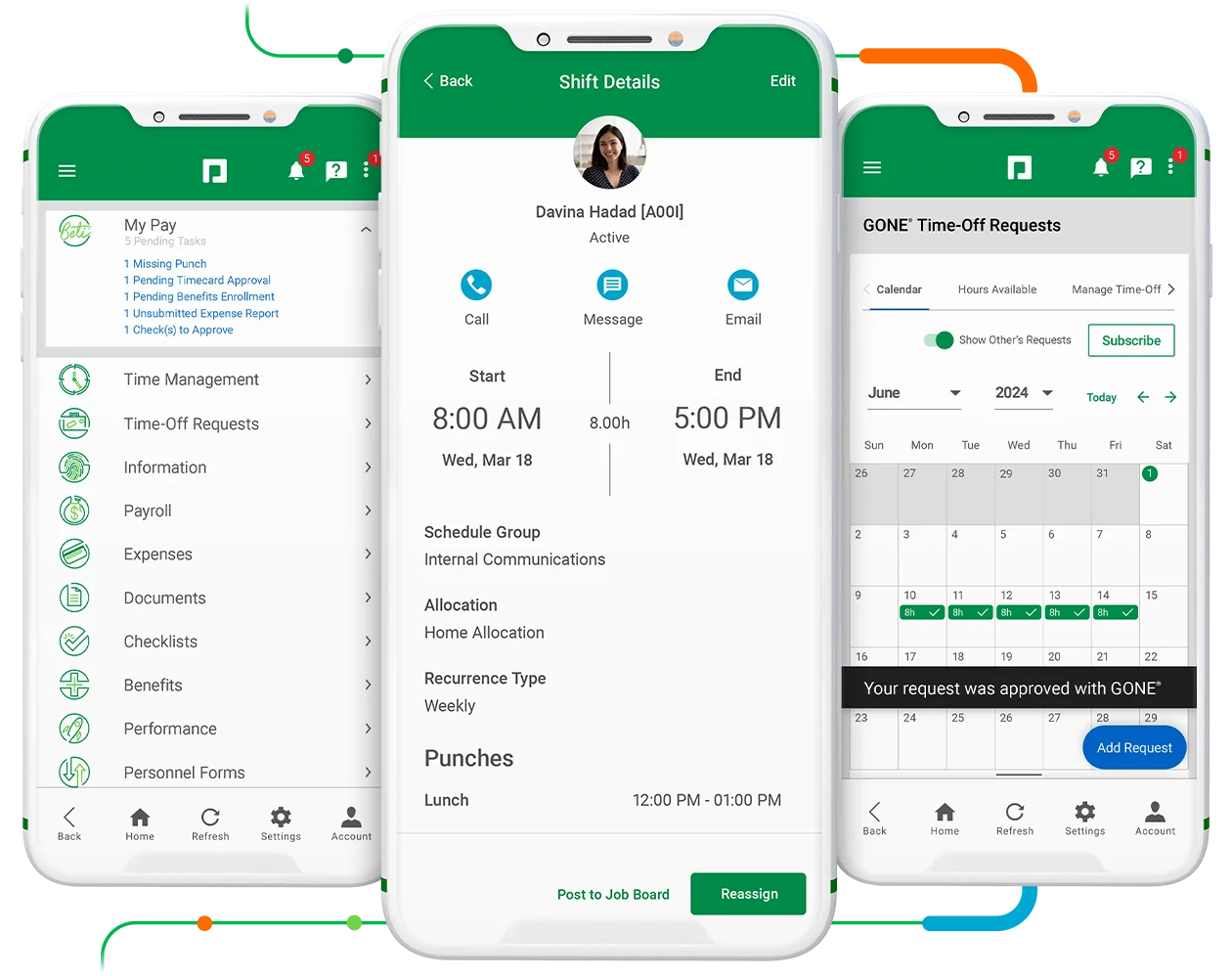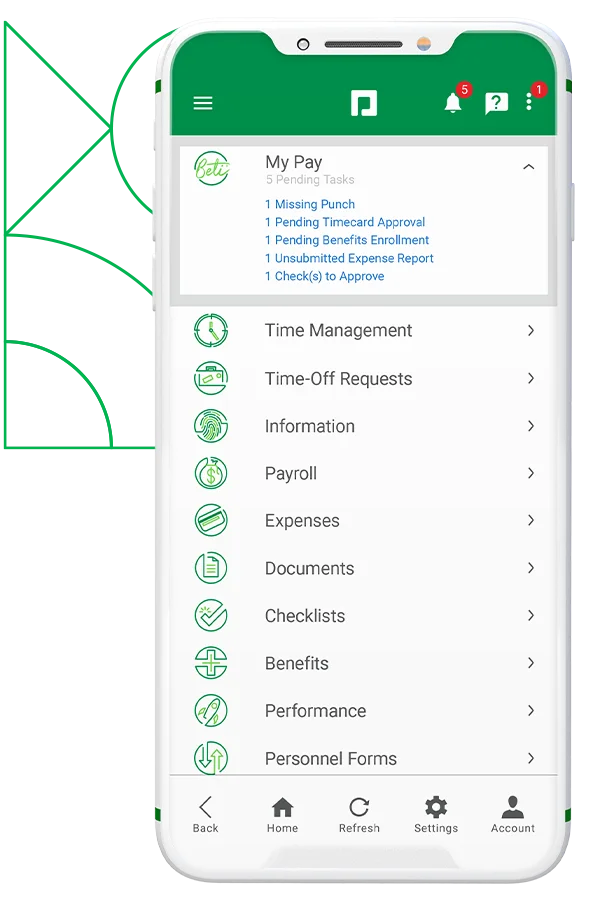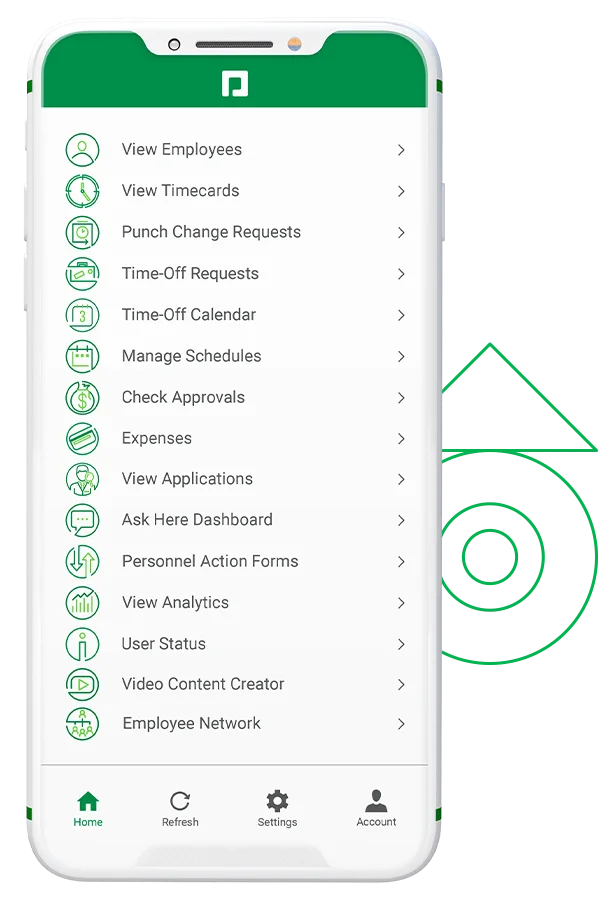Automated HR and payroll for hospitality
A single, easy-to-use, mobile software to help overcome turnover and serve customers


Real Results
Paycom x Prairie Knights Casino: Winning Big by Switching Back
When this casino and resort’s employees needed the tools to win, coming back to Paycom’s full-solution automation was the obvious choice.
“We’re putting responsibility back in the hands of the employee. They’re embracing that because they’re actually taking care of themselves. By going to the app and taking care of things they normally rely on us for — this frees up our time to do other things.”
—HR director

Why Paycom
Because providing the best service demands the best support

Your industry is built on making people feel at home — even when they’re miles away from it. But building that connection with patrons and delivering unforgettable service isn’t easy. Especially as HR pros face historically high turnover, absenteeism, talent shortages and strict compliance requirements, all while managing and scheduling employees who are always on their feet.
But you don’t have to face these challenges alone. Paycom’s single HR and payroll software for restaurants, hotels, resorts and more simplifies tedious tasks, empowers employees with their data and helps you maximize your ROI. This frees you to focus on enhancing the employee experience and guest satisfaction.

Award-winning HR and payroll innovation






names Paycom best app for employee-driven payroll
How we help
Put efficiency back on the menu

In your high-stress industry, the last things you need are data errors and disconnected systems. These issues make your job frustrating, sour your employees’ experience, damage morale and amplify burnout.
With Paycom, your success is our success. That’s why we provide all the HR and payroll tools you need in a truly single software with just one login and password. Plus, we know nothing beats world-class service. That’s why we assign you a dedicated specialist who knows your business and understands the challenges you face.

Show payroll errors the door
When you already wrestle with retention, a late or incorrect check doesn’t help. Our self-service payroll experience identifies errors and automatically guides your people to fix them before submission. With Paycom, you can even pay them daily through our hassle-free payroll card.
Tell turnover to pack its bags
If you can’t fill open positions and keep employees, customer service suffers. Paycom automates tedious recruitment tasks so you can find the right talent quickly. And once you hire them, our intuitive onboarding experience lets new employees complete important documents even before Day 1 — so they can start serving guests immediately.
Lay scheduling nightmares to rest
With around-the-clock schedules, fluctuating hours and seasonal shifts, ensuring coverage and protecting your staff’s work-life balance can be tough. Our mobile scheduling tool makes it easy for managers to create, edit, review and promote fairness with schedules from a high level. At the same time, our self-service tech also gives employees anytime access to their shifts, so they’re never in the dark.
Comply with confidence
With different employee types across multiple locations, ensuring you cover all your compliance bases can be tough without proper support. Whether it’s adhering to predictive scheduling laws or securing valuable tax credits and more, our compliance and reporting tools help simplify and automate your company’s regulatory burden.
Put employees first
Tech built for your people

Ultimately, employees make your business go. Their enthusiasm is infectious to your customers. And so is their frustration. Empower your staff with a convenient and stress-free experience with our employee-first tech.

Recruiting that plays for keeps
You can’t maximize profits — or your customers’ experience — when your people keep leaving. Our talent acquisition tools automate job postings, background checks and more. Meanwhile, candidates enjoy an experience that keeps them in the loop and proves you prioritize their needs.
Never compromise on service
Maintaining a high-quality guest experience is crucial to your brand’s reputation. But that’s easier said than done when employees and supervisors are distracted by HR tasks. Our self-service app has the tools they need to manage their data with ease. Paycom lets them quickly access the training, approvals and other important tasks they need — without pulling them away from the customers they serve.
Serve up fulfilling careers
Providing the best service for your customers means your people are always on the move. But that shouldn’t stand in the way of learning new skills and pursuing meaningful professional growth. Our intuitive learning management system and performance management tech streamlines training and provides them with the clear development path they expect. And once you’re ready to reward and promote them, our compensation budgeting tech ensures you do it fairly and within budget.
It’s time for simplicity
With full-time, part-time, hourly and contracted employees, managing time and attendance can be an ongoing struggle. Our time-off tech makes it easy for employees to clock in — day or night — and for you to prevent time theft. Plus, our time-off requests tool automates decision-making, giving employees instant answers while keeping you appropriately staffed. Best of all, employees’ approved time data automatically flows into payroll, so you don’t have to sort and manually apply complex time requirements.

Why Paycom’s different
True mobility for your nonstop industry
Hospitality moves fast, and so do your people. But when HR tech forces them to pull away from guests, it negatively impacts your bottom line. Whether for managers or their teams, our self-service app gives employees the tools they need right in the palm of their hands.
Employees can easily complete training, submit time off, enroll in benefits, verify their pay’s accuracy and more. And managers have the power to check schedules, make key decisions and drive their team’s success from anywhere. Got a complex, multishift structure to maintain? No problem. Our easy-to-use mobile app scales with your organization and the needs of your employees.

See what the hospitality industry is saying about Paycom
Frequently Asked Questions
Learn more about HR software in the hospitality industry
Hospitality HR and payroll software like Paycom helps businesses within the industry manage their entire workforce and their pay. From streamlining hiring and onboarding to automating complex scheduling needs and pay types, the right tech — in a truly single software — helps keep your hospitality org running seamlessly.
In the turnover-prone hospitality industry, you need a tech partner that prioritizes retention as much as you do. The right HR and payroll software, like Paycom, helps businesses empower employees with 24/7 access to their data and an accurate paycheck every time. Plus, you get help staying compliant with federal, state and local regulations — all while boosting the employee experience. The best part? Paycom’s full-solution automation frees your people from the administrative burden of manual tasks, so you get more time to provide quality customer service.
Yes! Paycom’s automated payroll experience, Beti®, self-starts each pay period, pulling live employee data that affects their pay. It also notifies both employees and managers of pending payroll tasks — like missing punches — throughout the pay period. Then, it automatically finds errors and guides employees to fix them before payroll submission.
Paycom provides comprehensive recruiting, hiring and onboarding tools to streamline the entire process. HR and recruiters can quickly and easily find the right candidates for each open position and hire them in one click. Plus, the Paycom mobile app empowers new hires to complete required forms and training even before Day 1, so they can immediately start contributing.
Whether it’s seamlessly onboarding and training employees or ensuring their paychecks are always accurate, Paycom’s mobile-friendly single software puts the tools employees need to succeed in the palm of their hand. With greater control and access to their own information, employees are more engaged in what matters most to them.
Labor costs are frequently hospitality’s biggest expense. Our Compensation Budgeting tool helps reward employees and keep wages competitive without going over budget. Once salary parameters are set, our seamless tech automatically factors performance review ratings and merit matrix values into payroll.

